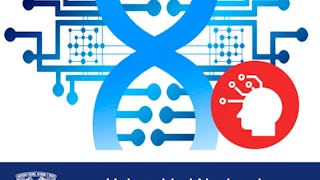- Browse
- Deep Learning
Results for "deep learning"
 Status: NewNewStatus: Free TrialFree Trial
Status: NewNewStatus: Free TrialFree TrialSkills you'll gain: Figma (Design Software), Responsive Web Design, UI Components, User Interface (UI), Layout Design, User Interface (UI) Design, Design Strategies, Web Design, Scalability, Prototyping
4.7·Rating, 4.7 out of 5 stars15 reviewsIntermediate · Course · 1 - 3 Months
 Status: Free TrialFree Trial
Status: Free TrialFree TrialSkills you'll gain: Rmarkdown, Box Plots, Plot (Graphics), Descriptive Statistics, Scatter Plots, Histogram, Jupyter, Matplotlib, Data Presentation, Ggplot2, Statistical Visualization, Data Manipulation, Statistical Hypothesis Testing, Regression Analysis, Correlation Analysis, Data Visualization, Data Visualization Software, Data Analysis, R Programming, Python Programming
3.9·Rating, 3.9 out of 5 stars25 reviewsBeginner · Specialization · 3 - 6 Months
 Status: FreeFree
Status: FreeFreeSkills you'll gain: Video Production, Storytelling, Video Editing, Content Creation, Animations, Generative AI, Editing
3.3·Rating, 3.3 out of 5 stars7 reviewsBeginner · Guided Project · Less Than 2 Hours
 Status: Free TrialFree TrialU
Status: Free TrialFree TrialUUniversidad Nacional Autónoma de México
Skills you'll gain: Algorithms, Computational Thinking, Applied Mathematics, Machine Learning Algorithms, Biology, Life Sciences, Artificial Intelligence, Computer Science, Programming Principles, Mathematical Modeling, Engineering Practices
4.1·Rating, 4.1 out of 5 stars22 reviewsIntermediate · Course · 1 - 4 Weeks
 Status: Free TrialFree TrialU
Status: Free TrialFree TrialUUniversity of London
Skills you'll gain: Pandas (Python Package), NumPy, Probability & Statistics, Unsupervised Learning, Statistics, Data Analysis, Statistical Analysis, Jupyter, Data Manipulation, Machine Learning Algorithms, Descriptive Statistics, Matplotlib, Data Visualization Software, Python Programming, Machine Learning, Data Preprocessing
4.6·Rating, 4.6 out of 5 stars21 reviewsBeginner · Course · 1 - 4 Weeks

Skills you'll gain: Salesforce Development, Salesforce, Visualforce, Artificial Intelligence, Artificial Intelligence and Machine Learning (AI/ML), AI Personalization, Data Quality, Customer Relationship Management (CRM) Software, Predictive Analytics, Email Automation, Data Management, ChatGPT, Data Capture, Generative AI, Business Ethics
Intermediate · Course · 1 - 3 Months
 Status: PreviewPreviewI
Status: PreviewPreviewIImperial College London
Skills you'll gain: Programming Principles, Microsoft Visual Studio, Computer Programming, Integrated Development Environments, Python Programming, Debugging, Development Environment
4.9·Rating, 4.9 out of 5 stars20 reviewsBeginner · Course · 1 - 4 Weeks
 Status: PreviewPreviewT
Status: PreviewPreviewTTechnical University of Denmark (DTU)
Skills you'll gain: Jupyter, Medical Imaging, 3D Modeling, Image Analysis, Engineering Analysis, Finite Element Methods, Numerical Analysis, Mathematical Modeling, Materials science, Simulation and Simulation Software, Digital Signal Processing, Python Programming, Applied Mathematics
4.7·Rating, 4.7 out of 5 stars66 reviewsMixed · Course · 1 - 3 Months
 Status: PreviewPreviewE
Status: PreviewPreviewEEmory University
Skills you'll gain: Rmarkdown, Knitr, Collaborative Software, Technical Documentation, Document Management, Technical Writing, Data Sharing, R Programming, YAML, Hypertext Markup Language (HTML), File Management, Cascading Style Sheets (CSS), Version Control
4.7·Rating, 4.7 out of 5 stars20 reviewsBeginner · Course · 1 - 3 Months

Skills you'll gain: Angular, Development Environment, Program Development, Web Development Tools, JavaScript Frameworks, Javascript, Web Components, Front-End Web Development, Web Development
4.4·Rating, 4.4 out of 5 stars20 reviewsBeginner · Guided Project · Less Than 2 Hours
 Status: Free TrialFree Trial
Status: Free TrialFree TrialSkills you'll gain: Sales Development, Customer Engagement, Responsible AI, Lead Generation, Sales Enablement, Generative AI Agents, Sales Management, Customer experience improvement, Sales Prospecting, Productivity Software, Sales, Data Ethics
Intermediate · Course · 1 - 4 Weeks
 Status: Free TrialFree TrialJ
Status: Free TrialFree TrialJJohns Hopkins University
Skills you'll gain: Non-Verbal Communication, Interpersonal Communications, Technical Communication, Verbal Communication Skills, Target Audience, Strategic Communication, Communication, Business Communication, Persuasive Communication, Technical Management, Professional Development, Leadership, Organizational Leadership, Active Listening, Organizational Structure, Presentations
4.8·Rating, 4.8 out of 5 stars21 reviewsIntermediate · Course · 1 - 3 Months
In summary, here are 10 of our most popular deep learning courses
- Figma Pro Pt. 1: Auto Layouts, Grids & Components: Skillshare
- Data Science and Analysis Tools - from Jupyter to R Markdown: Codio
- Cinematic Storytelling Simplified: Mastering Lumen5 AI: Coursera
- Cómputo evolutivo: Universidad Nacional Autónoma de México
- Statistics and Clustering in Python: University of London
- Salesforce Certified AI Associate Certification: Packt
- Introduction to Python for Researchers: Imperial College London
- Introduction to advanced tomography: Technical University of Denmark (DTU)
- Reproducible Templates for Analysis and Dissemination : Emory University
- AngularJS for Beginners: Getting Started: Coursera










